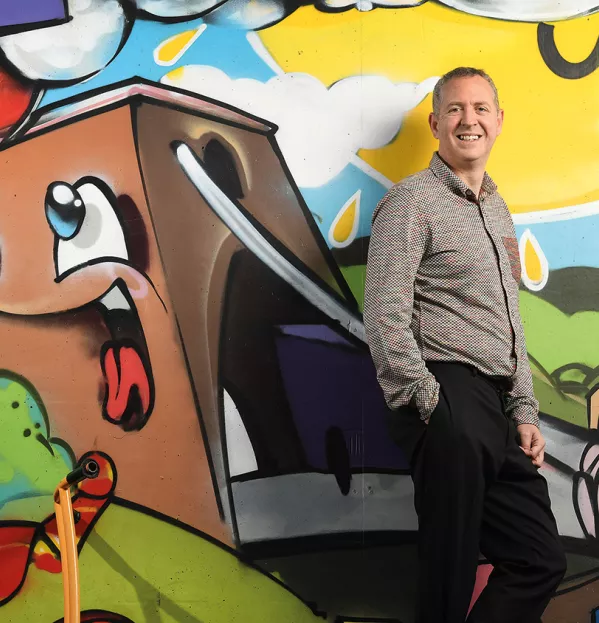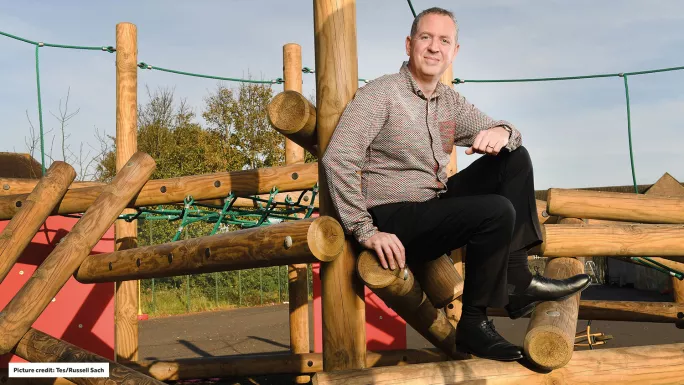‘Judge us by the outcomes of our children - judge us by what the children think’

David Moran is not someone who is afraid of the dramatic gesture. During a two-year tenure working for the schools district in Nashville, Tennessee, he tackled an overreliance on photocopied worksheets by cutting the plugs off the photocopiers.
And, in his current role as chief executive officer of E-Act multi-academy trust, he has put his scissors to different use: cutting up the company’s credit cards.
Moran took over the chain in 2013, following a government report criticising his predecessor’s freeness with the company credit card, including excessive expenses claims for first-class travel, expensive lunches and “prestige” venues.
Moran had moved from Nashville to take up the post of E-Act chief operating officer; he had only been in the job for a couple of days when the trust got a financial notice to improve. “Yeah. Yeah. It was: ouch,” he tells Tes.
It is half-term; Moran is sitting in a coffee shop in Bristol, where he, his wife and three children moved this summer.
The “ouch” did not end with the notice to improve. Moran was appointed chief executive in November 2013; the following January, Ofsted swooped in and inspected several of the trust’s schools in one go.
“And virtually every single result was ‘inadequate’, ‘inadequate’, ‘inadequate’,” Moran says. His speech is unhesitant; he is entirely matter-of-fact about this. “That was a very tough time. We still had a financial notice to improve, and all our schools were…Albeit we knew they weren’t doing well - now publicly they were doing awfully.
“But it was, ‘Right, we’ve now got to act with real pace and urgency. We’ve got to clear out everything other than the children. Actually, they’re the only thing that matters in all of this.’”

Since then, he has redefined the way that the trust operates. He refers to this as “that seesaw between autonomy and dependency”.
“My predecessor gave all schools complete autonomy for absolutely everything,” he says. “And one of the key strategies that I’ve used is to take some of that autonomy away, for anything that isn’t related to teaching and learning, anything that isn’t related to curriculum development, anything that really isn’t related to people development.
“So finances, estates, aspects of governance, I’ve pulled that autonomy away and centralised some of those functions, or regionalised them. It’s finding the right balance.”
But, he insists, curriculum decisions will remain in the hands of school leaders: “Every year, the schools will submit a curriculum model for their school. What are the subjects? How are we going to organise the children? Are we going to teach children in groups of 30, the traditional way? Or reduce class sizes for certain subjects, and increase sizes for other subjects? And it really focuses the discussion on the needs of the kids at that school.”
E-Act is made up of a group of 25 academies in total, clustered in London, the Midlands, the North, the South West and Daventry, Northamptonshire.
Previously, each member school had its own business manager; Moran sacked them. He cut his office staff from 80 people down to 12. Now all procurement requests go through the central office; all schools in the trust share one supplier for everything from electricity to payroll services.
‘I’d love Ofsted to come’
But he acknowledges that something of the trust’s old reputation lingers, nonetheless. “I think the name E-Act is something people will always associate with my predecessor, and a champagne lifestyle,” he says.
“I thought long and hard about changing our name. But, actually, that would have just been a waste of public money.
“Judge us by the outcomes of the children; judge us by what the children think; judge us by what the teachers think.”
Despite - or perhaps because of - his own experiences, he welcomes Ofsted’s recent suggestion that it should be allowed to expand its remit to inspect Mats formally: not just visiting a few schools, but poring over the accounts at head office.
“Yeah, I’d love them to,” he says. “Inspection is an integral part of any organisation’s improvement. I’ll work with anybody, if they’re interested in our children.
“I think there’s got to be an expectation that every Mat will be completely transparent, in terms of educational outcomes, in terms of attendance data, in terms of financial data.”
Moran’s interest in teaching began when he was 13 and returned to his old primary school to work with Year 6 children. Then he fell in love with biology and, specifically, ecology. “So all of that passion for my environment, that passion for biology - the best thing in the world I could possibly do with that is share that with young people,” he says.
But, as a teacher at Willesden High School, in north-west London, he began to see another side of teaching.
“These kids had so much baggage. And, actually, they weren’t going to engage with the science until some of their more fundamental needs were being met.”
He went on to become head of year at Willesden High. But then he decided to take himself out of his comfort zone, joining VSO as a science teacher in a remote corner of north-eastern Kenya.
“And I taught science without electricity, without running water. And it was - it was amazing. It was - hey, this is about the art of teaching. You don’t need an interactive whiteboard; you don’t need a photocopier; you don’t need anything other than your own knowledge of your subject and your own passion for your subject. It’s about relationships: ‘I believe in you; I believe you can do this.’”
This experience has led him, he says, to seek out schools in deprived areas, but also to place increasing value on all aspects of learning: academic and extracurricular.
A broader education
Moran is now in the process of developing a central fund to provide opportunities for children who would not be able to afford them otherwise. For example, when a pupil in Sheffield was selected to play for a Manchester United youth team, the fund paid for football boots, practice kit and the train fare.
This fund will also be used to finance an idea that he is calling the “E-Act passport”. The aim of this programme is to provide pupils with a broader, non-academic education: it will include activities such as visiting a library, visiting a Russell Group university and going to the theatre.
As Tes reported last week, E-Act is in the process of developing a “mental health curriculum” to run in all of its academies.
So far, Moran has raised £20,000 for E-Act’s extracurricular projects, by seeking external sponsorship from companies including Capita, HSBC and P S Financials. The aim is to bring this figure up to £1 million this year. (He has said that he will consider each sponsor on a case-by-case basis: “Nothing that would compromise our values.”)
And he also wants to use this fund in other ways: “I do have a vision that all of our schools will be open from 7.30am to 7.30pm.”
For example, Moran says, around 80 pupils at one of his Manchester schools turn up for breakfast club every morning. Worried that these children could go hungry during the school holidays, their teachers resolved to run the breakfast club once a week outside term-time. Properly funded, Moran says, this model could extend to all E-Act schools.
Conversations about breakfasts lead him in another direction, too. “Well, what about dinner? How many of our children sit around a table at night and have dinner? Have a proper dinner. Is that something we should be doing?
“Our children, more than anyone, they have these glass ceilings. So we’ve got to teach our children to think big for themselves, and we’ve got to teach all of the adults who work with them to think big for themselves, but also for the children.
“That’s the core of what we’re doing and why we’re doing it - to make our schools great schools for the kids, so they get the best possible outcomes.”
You need a Tes subscription to read this article
Subscribe now to read this article and get other subscriber-only content:
- Unlimited access to all Tes magazine content
- Exclusive subscriber-only stories
- Award-winning email newsletters
Already a subscriber? Log in
You need a subscription to read this article
Subscribe now to read this article and get other subscriber-only content, including:
- Unlimited access to all Tes magazine content
- Exclusive subscriber-only stories
- Award-winning email newsletters